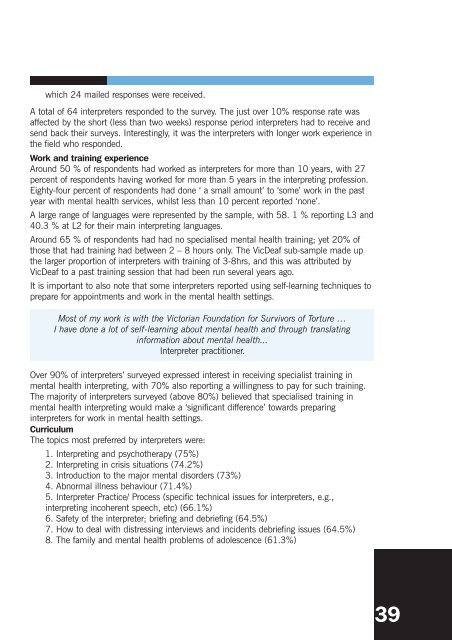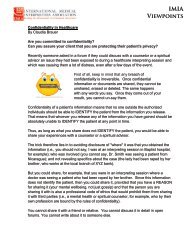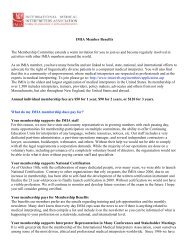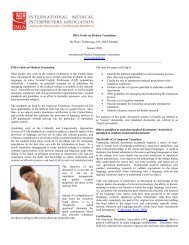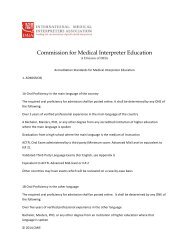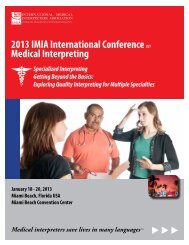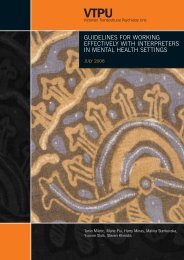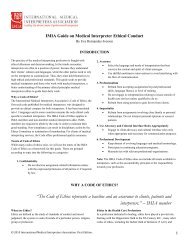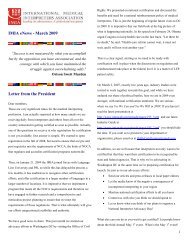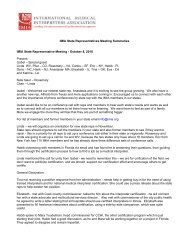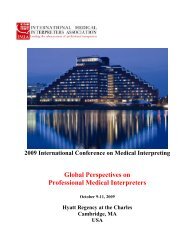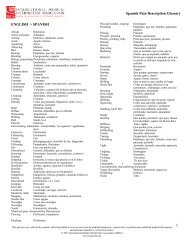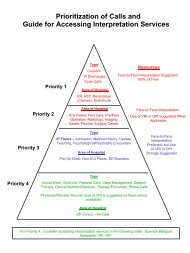improving the quality of mental health interpreting in victoria
improving the quality of mental health interpreting in victoria
improving the quality of mental health interpreting in victoria
You also want an ePaper? Increase the reach of your titles
YUMPU automatically turns print PDFs into web optimized ePapers that Google loves.
which 24 mailed responses were received.<br />
A total <strong>of</strong> 64 <strong>in</strong>terpreters responded to <strong>the</strong> survey. The just over 10% response rate was<br />
affected by <strong>the</strong> short (less than two weeks) response period <strong>in</strong>terpreters had to receive and<br />
send back <strong>the</strong>ir surveys. Interest<strong>in</strong>gly, it was <strong>the</strong> <strong>in</strong>terpreters with longer work experience <strong>in</strong><br />
<strong>the</strong> field who responded.<br />
Work and tra<strong>in</strong><strong>in</strong>g experience<br />
Around 50 % <strong>of</strong> respondents had worked as <strong>in</strong>terpreters for more than 10 years, with 27<br />
percent <strong>of</strong> respondents hav<strong>in</strong>g worked for more than 5 years <strong>in</strong> <strong>the</strong> <strong><strong>in</strong>terpret<strong>in</strong>g</strong> pr<strong>of</strong>ession.<br />
Eighty-four percent <strong>of</strong> respondents had done ‘ a small amount’ to ‘some’ work <strong>in</strong> <strong>the</strong> past<br />
year with <strong>mental</strong> <strong>health</strong> services, whilst less than 10 percent reported ‘none’.<br />
A large range <strong>of</strong> languages were represented by <strong>the</strong> sample, with 58. 1 % report<strong>in</strong>g L3 and<br />
40.3 % at L2 for <strong>the</strong>ir ma<strong>in</strong> <strong><strong>in</strong>terpret<strong>in</strong>g</strong> languages.<br />
Around 65 % <strong>of</strong> respondents had had no specialised <strong>mental</strong> <strong>health</strong> tra<strong>in</strong><strong>in</strong>g; yet 20% <strong>of</strong><br />
those that had tra<strong>in</strong><strong>in</strong>g had between 2 – 8 hours only. The VicDeaf sub-sample made up<br />
<strong>the</strong> larger proportion <strong>of</strong> <strong>in</strong>terpreters with tra<strong>in</strong><strong>in</strong>g <strong>of</strong> 3-8hrs, and this was attributed by<br />
VicDeaf to a past tra<strong>in</strong><strong>in</strong>g session that had been run several years ago.<br />
It is important to also note that some <strong>in</strong>terpreters reported us<strong>in</strong>g self-learn<strong>in</strong>g techniques to<br />
prepare for appo<strong>in</strong>tments and work <strong>in</strong> <strong>the</strong> <strong>mental</strong> <strong>health</strong> sett<strong>in</strong>gs.<br />
Most <strong>of</strong> my work is with <strong>the</strong> Victorian Foundation for Survivors <strong>of</strong> Torture …<br />
I have done a lot <strong>of</strong> self-learn<strong>in</strong>g about <strong>mental</strong> <strong>health</strong> and through translat<strong>in</strong>g<br />
<strong>in</strong>formation about <strong>mental</strong> <strong>health</strong>...<br />
Interpreter practitioner.<br />
Over 90% <strong>of</strong> <strong>in</strong>terpreters’ surveyed expressed <strong>in</strong>terest <strong>in</strong> receiv<strong>in</strong>g specialist tra<strong>in</strong><strong>in</strong>g <strong>in</strong><br />
<strong>mental</strong> <strong>health</strong> <strong><strong>in</strong>terpret<strong>in</strong>g</strong>, with 70% also report<strong>in</strong>g a will<strong>in</strong>gness to pay for such tra<strong>in</strong><strong>in</strong>g.<br />
The majority <strong>of</strong> <strong>in</strong>terpreters surveyed (above 80%) believed that specialised tra<strong>in</strong><strong>in</strong>g <strong>in</strong><br />
<strong>mental</strong> <strong>health</strong> <strong><strong>in</strong>terpret<strong>in</strong>g</strong> would make a ‘significant difference’ towards prepar<strong>in</strong>g<br />
<strong>in</strong>terpreters for work <strong>in</strong> <strong>mental</strong> <strong>health</strong> sett<strong>in</strong>gs.<br />
Curriculum<br />
The topics most preferred by <strong>in</strong>terpreters were:<br />
1. Interpret<strong>in</strong>g and psycho<strong>the</strong>rapy (75%)<br />
2. Interpret<strong>in</strong>g <strong>in</strong> crisis situations (74.2%)<br />
3. Introduction to <strong>the</strong> major <strong>mental</strong> disorders (73%)<br />
4. Abnormal illness behaviour (71.4%)<br />
5. Interpreter Practice/ Process (specific technical issues for <strong>in</strong>terpreters, e.g.,<br />
<strong><strong>in</strong>terpret<strong>in</strong>g</strong> <strong>in</strong>coherent speech, etc) (66.1%)<br />
6. Safety <strong>of</strong> <strong>the</strong> <strong>in</strong>terpreter; brief<strong>in</strong>g and debrief<strong>in</strong>g (64.5%)<br />
7. How to deal with distress<strong>in</strong>g <strong>in</strong>terviews and <strong>in</strong>cidents debrief<strong>in</strong>g issues (64.5%)<br />
8. The family and <strong>mental</strong> <strong>health</strong> problems <strong>of</strong> adolescence (61.3%)<br />
39


